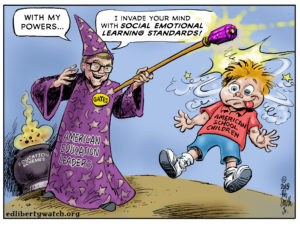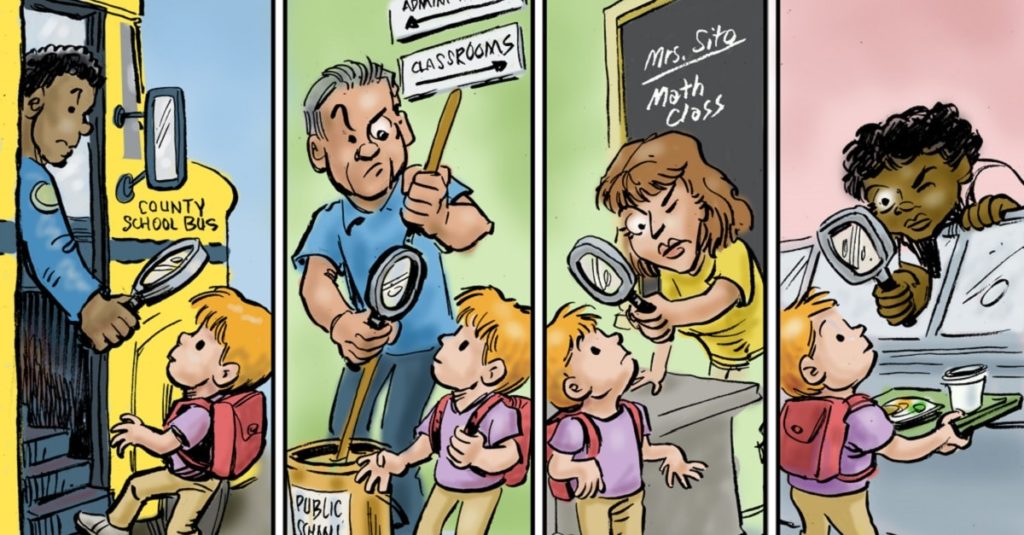The Federalist: Meet ‘Social-Emotional Learning’: New Education Fad, Same As The Old Fads
The Federalist recently published an op-ed about social emotional learning by Dr. Effrem and Harvard trained attorney and researcher Jane Robbins. Here is an excerpt:
In a nutshell, it’s the latest fad to send the same old message pushed by progressives for more than a century that education should focus less on knowledge of academic content and more on student attitudes, mindsets, values, and behaviors. Does Emily demonstrate sufficient leadership? Does John show the right amount of empathy? SEL cheerleaders also seem hopelessly mired between the competing goals of promoting government-determined, standardized attitudes and assessments, and assuring everyone that they care about children as individuals.
The federal government is pushing SEL on state and local education systems through prescriptive school accountability requirements, grants, and other programs—more than 100 federal programs in seven federal departments and a myriad of agencies, helpfully listed by proponents, even as they say SEL should be a state and local endeavor.
As admitted by the U.S. Department of Education and national special-interest groups, SEL is an integral part of the Common Core State Standards and Competency-Based Education (CBE) movements. CBE digitally documents attainment of SEL and other skills to declare a student ready to move on in his or her “personal learning path,” and supplies data for corporations wanting employees with attitudes fitting their plans. Both these movements are failing academically, and SEL further dilutes the already sub-standard academic education of both.
Please read the full article here.
The National Pulse: “Social Emotional Learning” Standards Continue Ominous National March
Here are excerpts from a recent article at The National Pulse about the continued relentless push for subjective, non-academic, parental autonomy destroying social emotional learning programs:
Despite lots of concerns by Ohio parents and pro-family state school board members, as well as troubling data provided by Education Liberty Watch, (summarized here) and activism by Eagle Forum and Concerned Women for America, the full Ohio state board adopted statewide SEL standards by an 11-6 vote. Although there were promises made that students, teachers, and schools would not be assessed or rated on these standards, the strategic plan putting the SEL standards adoption into motion the previous year clearly states in several places that they would be. The board also voted down a resolution by member Kirstin Hill, who led the opposition, to codify that these standards would not be assessed…
…Presidential candidate and New York City Mayor Bill de Blasio has also significantly changed school discipline policies in that city’s public schools, both by imposing social emotional learning programs and restorative justice programs. SEL is going to be in every middle school in the city…
…The last piece of evidence I would offer for this steady and depressing march toward government mandated SEL is a statement by another Democrat presidential candidate, Congressman Tim Ryan of Ohio, who said in the first night of the Democratic presidential debate:
Ninety percent of the shooters who do school shootings come from the school they’re in, and 73 percent of them feel shamed, traumatized, or bullied. We need to make sure that these kids feel connected to the school. That means a mental health counselor in every single school in the United States. We need to start playing offense. If our kids are so traumatized that they’re getting a gun and going into our schools, we’re doing something wrong, too, and we need reform around trauma-based care.
Unfortunately, the congressman is ignoring lots of evidence that SEL and mental screening does not work to prevent school violence. Ryan has been an SEL supporter for a long time and is making it a major centerpiece of his education policy platform. He was actually honest enough to admit that SEL is an integral part of Common Core and more important than academics during final debate on the Every Student Succeeds Act.
You may read the full article here.
New Study Shows Dangers and Ineffectiveness of “Social-Emotional Learning”
This article by Dr. Karen Effrem highlights the new study by The Pioneer Institute coauthored by her, attorney and researcher Jane Robbins and Dr. Kevin Ryan , a professor emeritus of Boston University. The study shines light on the harmful tactics of moving the focus of education away from academics, of data collection, and how the state is invading the privacy of public school students.
You can view a video previewing the study here made by The Pioneer Institute. Here are excerpts from the Pioneer press release:
Proponents of SEL call for focusing less on academic content and knowledge in schools, and more on student attributes, mindsets, values, and behaviors. Not only are the goals of SEL ill-defined, but they also raise significant, unanswered questions about what attitudes should be promoted.
“It’s one thing to direct your own moral, ethical, and emotional development or that of your children,” said Jane Robbins, co-author of “Social-Emotional Learning: K-12 Education as New-Age Nanny State.” “But having a government vendor or unqualified public school officials implement an SEL curriculum based on coffee-table psychology is quite another.”
Educational software developers purport to have created products that can determine a number of sensitive personality traits through students’ interaction with digital platforms. Much of this monitoring occurs without the consent of children or their parents. Some software — especially for video gaming — goes beyond assessing traits, and aims to encourage the production of students who are well suited for a workforce development-centered education.
“This technology, when coupled with SEL, will further spread the recent wave of amateur, unqualified psychoanalysis in schools,” said Dr. Karen Effrem, M.D., who co-authored the study with Robbins. “Given the uncertainty around diagnosis and treatment of mental or emotional problems, even by highly trained physicians, the SEL movement runs the risk of further increasing the trend toward dangerous over-diagnosis and over-medication of American schoolchildren.”
Social-emotional learning is being interwoven into the Common Core State Standards and school efforts to implement competency-based education (CBE). CBE digitally documents the attainment of various skills with the goal of demonstrating that a student is ready to move on in his or her “personalized learning path.” SEL and CBE are heavily weighted toward a conception of education as focused on workforce development rather than preparing active, informed citizens.
As the calls for increased school-based mental health screening, data collection and treatment become more intense and numerous in light of school shootings such as that in Parkland, Fla., this study serves as a counter-weight to those calls. It thoroughly covers the lack of scientific support for SEL assessments and programs, particularly for mental health screening with astronomically high subjectivity and false positive rates; the lack of effectiveness data for school-wide Positive Behavioral Interventions and Supports (PBIS — see pp. 15-16); and the dangers of over-diagnosis by untrained school personnel and treatment with drugs that have many harmful, if not fatal side effects (see p. 30).
The mingling of SEL with Common Core has allowed the very orderly, objective discipline of math to be degraded with fuzzy, subjective issues like “grit” and a “growth mindset,” which even the staunchest proponents like “grit guru” Angela Duckworth and other researchers admit are not supported by reliable assessments or significant beneficial outcomes (see pp. 18-20). Moreover, numerous stakeholder groups have admitted that Common Core is tightly tied to SEL. Education Week admitted that SEL is being used for lessons in social justice, and Richard Hess and Grant Addison of the American Enterprise Institute have also shown how Common Core professional development lessons are taking a hard left turn into racial politics and social justice.
SEL skills, called competencies by the American School Counselors’ Association, are often infused in the computerized skills testing of CBE — which has failed in multiple jurisdictions where it has been tried. It will be important for Florida Governor Ron DeSantis and Commissioner of Education Richard Corcoran to be extremely careful as they seek to fully rid the Sunshine State of Common Core that they do not allow corporate and establishment interests to keep SEL parameters in new standards and do not expand CBE in that state so as to prevent the efforts to “streamline testing” (as called for in the executive order) from becoming online SEL profiling in the embedded assessments.
You can view the full article on The National Pulse.
Multiple States Seek to Expand Invasive Mental Health Screening in Schools
This article by Dr. Karen Effrem written for The National Pulse details the problematic features of the expansion of mental health screening in the public school system, most notably how false positives in the system lead to over-diagnosis and over-medication in children.
In the wake of multiple horrific school shootings — particularly the Parkland, Fla., massacre where 17 people were murdered by a student long-known to have mental issues — states all over the nation have been moving to expand mental health screening, treatment, and data collection. The two most prominent states are Florida and Texas, but Georgia and other states are also joining this dangerous craze.
The Marjory Stoneman Douglas High School Safety Act (extensively discussed in this space) expanded mental screening of students by unqualified, minimally trained teachers and other school personnel despite admissions by psychiatric physicians trained for years that they are unable to correctly identify those known mentally ill patients that will become violent. The psychiatrist that extensively studied the history of the Sandy Hook shooter that killed 26 young children and teachers said about the Parkland shooting:
“It really means we can’t rely on prediction and identifying the bad guys. Because we’ll misidentify some who aren’t bad guys, and we’ll fail to identify others who may become bad guys.”
If a highly trained psychiatrist is saying that, why should we put that enormous responsibility on already overburdened teachers?
This type of data collected by untrained personnel would go into the state longitudinal databases to follow a student for life and could result in mislabeling of a child or life-altering consequences affecting college, career, military service or gun ownership.
Screening is also admitted even by experts to be terribly inaccurate, with false-positive rates of up to 84 percent, and can lead to over-diagnosis and over-medication. Dr. Mark Olfson, the scientific director of the TeenScreen mental screening program with that 84 percent false positive rate, admitted in July before the federal School Safety Commission (p. 38-39) that “the overall increase in youth psychotropic medication use has occurred among those with less severe or no impairment.” Even though Dr. Olfson did not admit it, that increase among those with less severe or no impairment is likely due to false positives from inaccurate screening like his TeenScreen instrument. During that same hearing, he also admitted some of the dangerous side effects of psychotropic medications in children and teens, such as “uncertainty over the long-term effects on the developing brain” and “weight gain, high cholesterol levels and increased risk of diabetes.”
What he did not mention was the documented risk of suicidal and violent ideation and behavior of these drugs as shown in his own research and in information available from an analysis of reports of violence to the Food and Drug Administration. (More research and links on this topic are available here and here.)
Even worse, the follow-up school safety legislation proposed by the Florida Senate seeks to create a work group to develop a “Statewide Threat Assessment Database.” The type of data to be entered based on what criteria, who would enter it and who would have access to it are all yet to be determined. Consent and privacy issues related to this are based on the extremely weak Family Education Rights and Privacy Act (FERPA) that was gutted in 2012 by the Obama administration.
Attorney and researcher Jane Robbins explained the problems with this concept when testifying against a similar bill in Georgia described by the Atlanta Journal Constitution:
“Do we want our children to be flagged by the government based on an algorithm when we don’t even know who created the algorithm or what factors go into it,” said Jane Robbins, an education lobbyist who testified on behalf of Concern Women for America. She said profiling based on demographic information could produce biased, inaccurate results that violate students’ privacy and free speech rights while creating documents that “could come back to haunt them forever.”
The full article can be read at The National Pulse’s website.
Issues
- Assessments + Testing (25)
- Bullying/Sex Education (6)
- Child Protection League (2)
- Common Core Standards (78)
- Curriculum + Standards (65)
- Data Collection and Data Privacy (64)
- Early Education/Nanny State (75)
- Federal Education (128)
- International Education (6)
- LGBT Issues in Education (9)
- Media Appearances (4)
- PL/CBE (2)
- Planned Economy (11)
- Politics of Education (26)
- School Violence (9)
- Social Emotional Learning/Mental Health (52)
- State Education (89)
- Testimony/Presentations (17)
- Uncategorized (13)
- Unions (10)
Education Liberty Watch Projects
ELW Allies
- American Principles Project
- Cato Institute
- Conservative Teachers of America
- Constitutional Coalition
- Eagle Forum
- Minnesota Advocates and Champions for Children
- Missouri Education Watchdog
- Restore Oklahoma Parent Empowerment
- Stop Common Core
- The Pioneer Institute
- Truth in American Education
- What is Common Core – Education Without Representation



